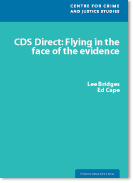The universal right of all suspects to consult with a solicitor of their choice has been undermined by recent changes introduced by the government to the delivery of legal advice for those arrested and detained by the police, claims a report published by the Centre for Crime and Justice Studies.
The authors, Professors Lee Bridges and Ed Cape, argue that the new services:
- were never properly evaluated;
- were forced through after a rushed and inadequate consultation and botched parliamentary procedure;
- are of questionable legality under the Police and Criminal Evidence Act;
- may contravene the European Convention on Human Rights; and
- fly in the face of a substantial and accumulated evidence base on access to legal services at police stations.
The report, CDS Direct: Flying in the face of the evidence, examines in detail the introduction of two related schemes, in 2008, for the delivery of advice to those arrested and detained by the police: Criminal Defence Service (CDS) Direct and the Defence Solicitor Call Centre (DSCC). It finds that a previous government commitment to equitable access to legal representation has been replaced by a drive to secure convictions and to limit access to legal services.
Professor Ed Cape said:
Previously, when a person arrested and detained in a police station asked for a lawyer, the police were obliged to contact that lawyer directly as soon as possible. Now, even in a straightforward drink-driving case where the suspect is willing to pay privately, they will have to go through six stages of referral before they can speak to their lawyer. More worrying is the fact that this can also be the case for a suspect who is mentally ill. The schemes may save a small proportion of the legal aid budget, but at what cost to access to justice?
Professor Lee Bridges added:
All previous research has shown that any bureaucratic obstacles or delays in the process will put off people arrested from exercising their right to independent legal advice. In light of this research, previous governments have tried to remove such obstacles and even banned the police from using various tactics to discourage suspects in police stations from seeking legal advice.
The new CDS Direct scheme seems to be giving greater priority to meeting the demands of government ministers to drastically curtail legal aid costs than to the duty to promote citizens' access to legal advice and assistance.
Richard Garside, director of the Centre for Crime and Justice Studies commented:
A cornerstone of any just criminal justice system is that defendants and those accused of crime have access to timely and good quality legal advice. This report raises important questions about whether, in its drive to cut costs and rush to bring more offenders to justice, the government has undermined this fundamental principle.
